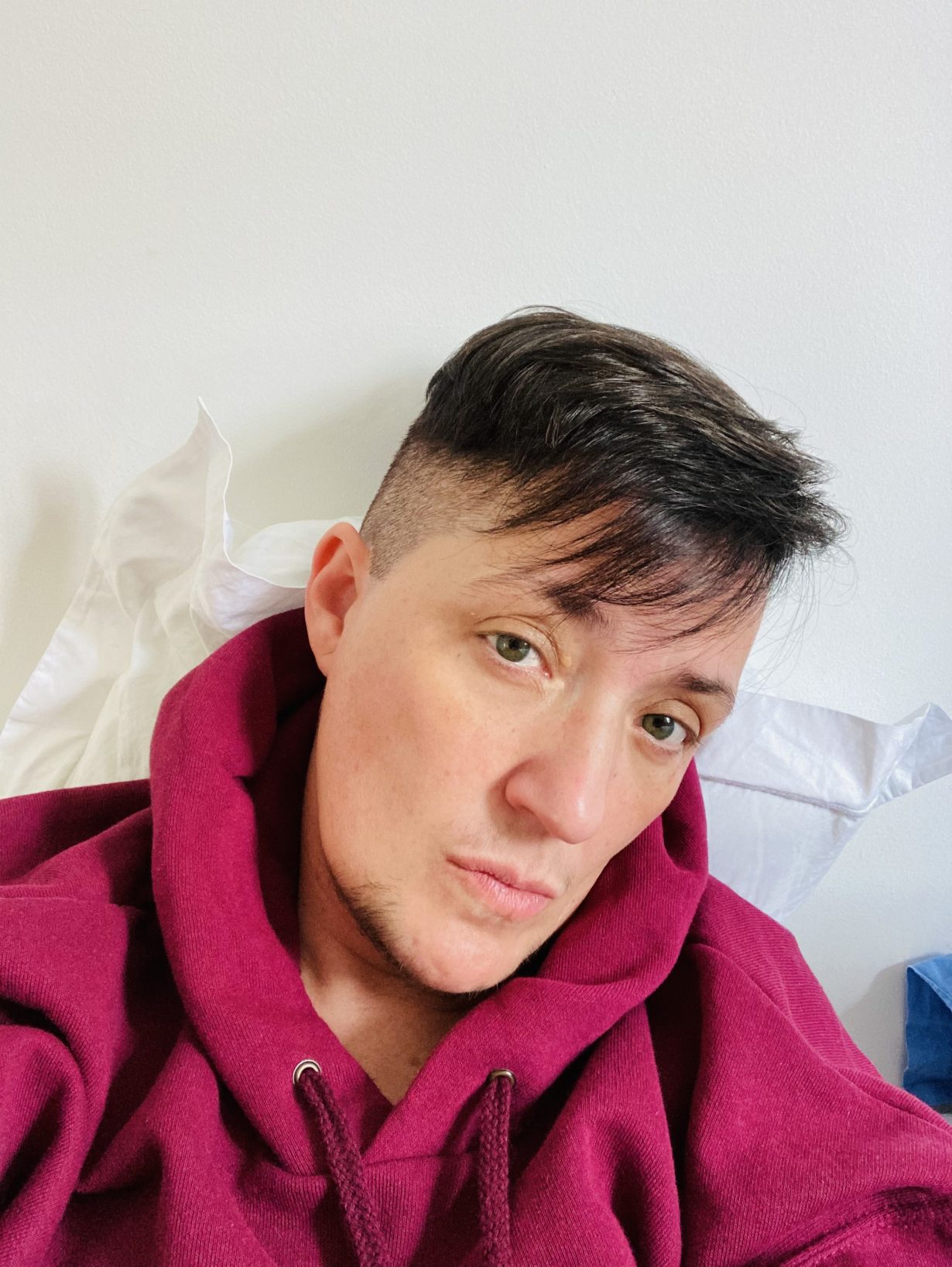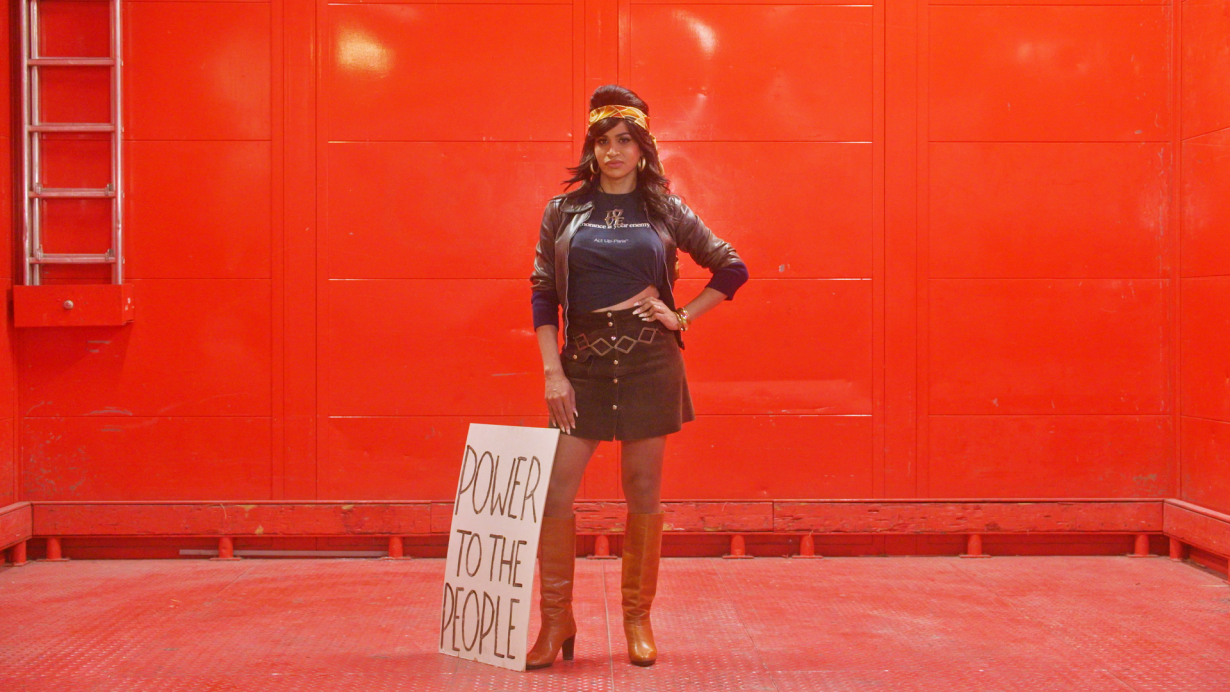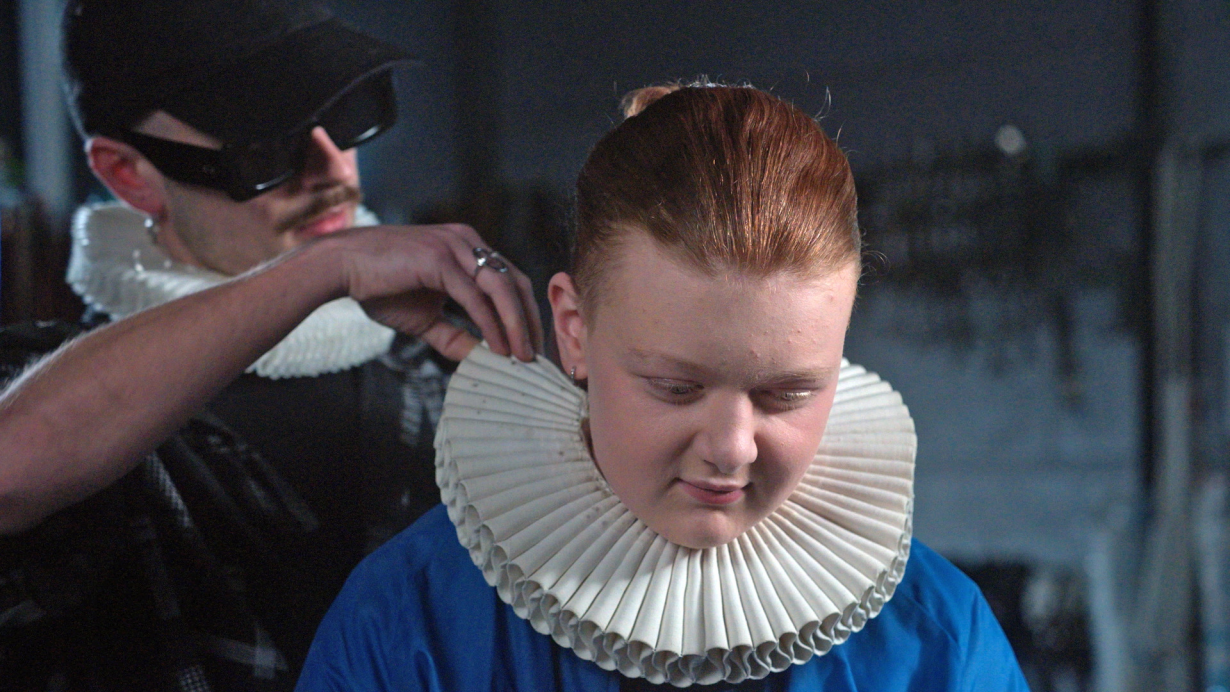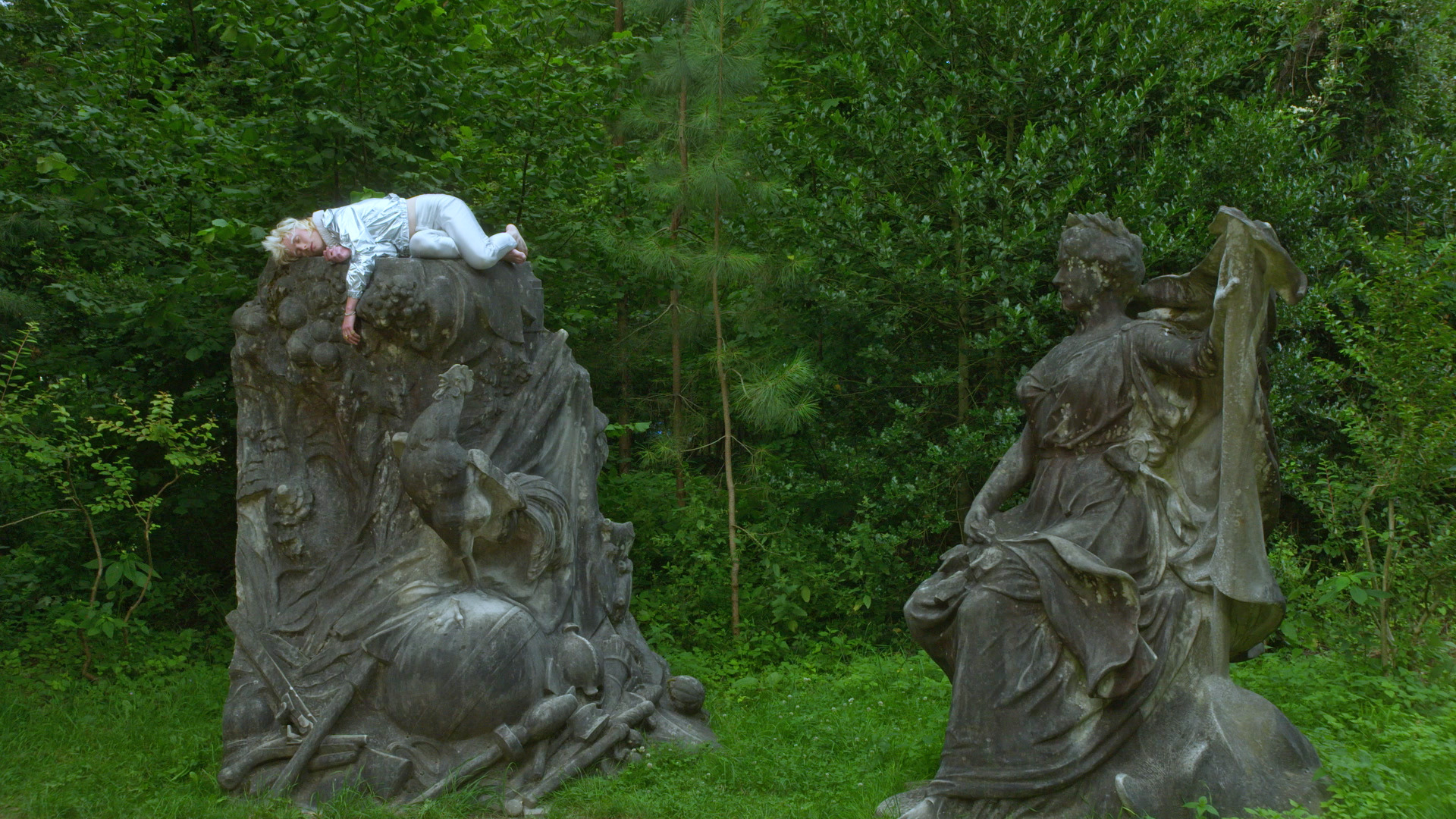“For me, books are open. The beginning of a book is not its first sentence, and the end is not its last. Books are expansive, almost like voracious entities”
Somebody once asked the philosopher cum curator Paul B. Preciado why he didn’t write his own biography. “Because fucking Virginia Woolf wrote it for me in 1928,” he says in the opening scene of his debut film, Orlando, My Political Biography (2023) – an adaptation of Woolf ’s genre-bending modernist novel. The premise, then, seems to be: ‘If you can’t write it, film it.’ With no prior directing experience, the Spanish-born and Paris-based author of Testo Junkie (2008) and An Apartment on Uranus (2019) was an unlikely candidate for the job. But despite his initial hesitations (more on that below), he’s regaled us with 98 minutes of wit and intellectual extravagance that both contrast and complement Sally Potter’s comparatively loyal 1992 adaptation.
Playing in UK cinemas from July, Orlando – written as well as directed by Preciado – seamlessly navigates between the conventions of documentary filmmaking and literary adaptation. (It has already won a string of awards, including the 2023 Berlinale’s Teddy Award for the Best Documentary Film.) The film follows a cast of some 20 trans and nonbinary characters of all ages and walks of life – most of whom are played by nonprofessional actors. Much like Woolf ’s Orlando – an Elizabethan aristocrat who mysteriously changes sex and goes on to live for three centuries – Preciado’s protagonists traverse time and space in unconventional ways. “If only you knew,” we hear the philosopher say, addressing Woolf herself, “the contemporary world is full of Orlandos.”
Throughout the film, these modern-day Orlandos recite extracts from the classic novel while sharing aspects of their own personal experiences of gender-affirming surgeries, encounters with the psychiatric institution and family relations. Unlike Woolf ’s courtly protagonist, this makes Preciado’s horde comparatively relatable. (These accounts are punctuated by a handful of notable cameos by figures such as the artists Pierre et Gilles and the novelist Virginie Despentes.) More than a queer literary icon, here the figure of Orlando becomes the aesthetic and revolutionary template for a ‘people to come’, as Deleuze and Guattari might put it: the invention of ‘modes of existence and possibilities of life’.
Produced by the Franco-German television channel ARTE, Orlando was crafted on a modest budget. Costumes are unapologetically minimal, often consisting of a mere neck-ruff. Sets such as a landscape backdrop or a mock boat-deck are filmed beyond their cinematic frame, revealing the behind-the-scenes of the film. It’s a rather punk take on Woolf’s novel, one that draws equally on the dialectic quality of philosophy seminars and the methods of AIDS video activism.
One morning in December 2023, the day after the film’s London preview at the Barbican, I sat down with Preciado in a café to discuss representational politics, negotiating the televisual context and the radical power of poetry.

With or Without Me
ArtReview Let’s start at the beginning: the genesis of the film. I know it was commissioned by ARTE.
Paul B. Preciado Well, I don’t know if I would say ‘commissioned’. ARTE came to see me saying, ‘We want to make queer films. We don’t know exactly what this means. But we know we’d like to open the audience in that direction.’ So I had a series of discussions with them. Then at a certain point they came back to me saying, ‘We want to make a biopic: a film about your work.’ They had already made a couple of films, one about a trans girl and one about Bambi, one of the first trans women to come out publicly, who became a media figure in France during the 1970s. So, they had made these two films and when they spoke to me…
AR … you felt you would become part of that series.
PBP Immediately. They thought, ‘OK, we made these two films, we need something in between.’ Of course, both of them are about a female trans-person. So they thought it might be interesting to have me in the middle. What they had in mind was a very classical documentary. Someone would go to the village where I was born and interview my parents, go to my school, then interview me… That was a horrifying idea.
So, immediately, I tried to tell them not to do it. I tried to convince them there were many other interesting things they could do. I said: ‘Make a documentary about Michel Foucault.’ Or, ‘Why don’t you make a film about Monique Wittig?’ And they were like, ‘Well, Monique Wittig is not so well known.’ Which is not true!
So at a certain point I was desperate. They really wanted to make this film and I had the impression that they would make it, with or without me. And, really, the idea of Orlando came to me as a joke. I said to them, ‘I will not allow you to do this unless it’s an adaptation of Orlando by Virginia Woolf.’ To me, this was a way of saying: ‘end of the conversation’. I never thought they would like the idea. But as soon as I said it, one of them asked: ‘Who’s going to make the film?’ Then the head of the team said: ‘Maybe Paul could do it.’ At that moment, I don’t know what came to me. Still today, I’m thinking: why did I say yes?
AR But it worked out.
PBP Yes, it worked out. And you know, it’s a professional context that is at odds with what I normally do. ARTE’s idea for the film was making a 52-minute documentary. That felt too short. Now, in its final form, it’s very long. I almost kept it a secret [from the producers] because I knew from the beginning that I was doing something very different from what they expected.

An Image of Transness
AR It’s interesting the way you describe this negotiating of the televisual context. It reminds me of the film Hervé Guibert made during the early 1990s, La Pudeur ou l’impudeur [Modesty and Shame, 1992], which documents the final months of his life before he died of AIDS-related complications. It was produced by Pascale Breugnot, a figurehead of reality television in France. She came to him with a camcorder saying, ‘Why don’t you make a film in which you will be both the author and the subject?’ Guibert originally came up with this exuberant film filled with fictional dérives. It opened with his friend, the artist Sophie Calle, stalking him to the island of Elba while filming him. There were all these insane scenes. Then the production team pushed to edit the film down and it essentially became a documentary portrait of a patient dying of HIV/AIDS. It’s a beautiful film, but it’s not what he had envisioned originally. Were you worried your vision would be reduced to a preestablished format?
PBP It’s interesting that you’re speaking about that film – I kind of forgot about it. Even though, when I was making Orlando, I could have had my hands on Guibert’s manuscript for his [unrealised] adaptation of Herculine Barbin’s memoirs. At the time, I was struggling. Not so much with ARTE – they called me 15 days after signing the contract and said, ‘Do you have the script for the film?’ I told them that I was figuring out what I needed to do, and that I would need some time. They left me alone. But I had this almost epistemic collapse in which I thought, ‘How am I going to do this?’ I started to think about my aversion to so many films. The way I’ve been critical of representation, of something being immediately captured by the camera. I thought, ‘How am I going to do it without immediately giving a fixed image of who Orlando is, like creating an image of what transness is?’ So I started to look into authors I like that had made or failed to make adaptations.
AR Les films fantômes, as Guibert might put it. [In 1981 the French novelist published a series of essays titled L’Image fantôme, or ‘Ghost Image’.]
PBP Exactly. So, I looked into Pasolini’s obsession for adapting theatre and how these adaptations were made, like Medea. What are the characters and actors he’s using to play these historical or mythical figures? I also looked into Almodóvar’s first films, his 1978 adaptation of Salomé by Oscar Wilde. It’s a completely crazy adaptation in which he’s playing all the characters with his friends, and you have the weirdest image of Salomé in the middle of the countryside. I find that extremely interesting. Then of course I thought about Hervé Guibert, who had this idea of adapting the memoirs of Herculine Barbin.
AR With Isabelle Adjani!
PBP Yes!
AR Didn’t Guibert want Adjani and her brother to play Barbin at different stages of her life?
PBP Absolutely. Thank God they didn’t do that! But I was interested to see how Guibert had translated Barbin’s biography into a script. So I did a lot of research, trying to find some references. I came to the conclusion that I had two pantheons of films. On one side queer films, mostly underground and coming from art. One of these films is Hans Scheirl’s Dandy Dust. When I first met Hans, he was a good friend of Del LaGrace Volcano, and I remember seeing them making this film in a really DIY manner. So that’s a film I went back to, among others by Jack Smith or Shu Lea Cheang, for whom I’ve written some scripts. And on the other side I found myself obsessively reviewing documentary essays. Like Jean-Luc Godard’s, of course. All the questions I was asking myself – like, ‘How to represent without reducing or transforming the image to an identity’, questions about biography, or the relationship between fiction and reality – were questions he was asking himself. At a certain moment, when Godard was becoming well known, he even had this intuition that he must destroy cinema in order to make cinema.
AR Last night at the Barbican’s preview of Orlando, you discussed how your methodological influences came mainly from philosophy and activism. That was enlightening to me. Particularly as the film plays with the modalities and hierarchies of discourse, from truth to falsehood, documentary to fiction. That, to me, evokes the tradition of alternative AIDS media born within ACT UP – groups like DIVA TV and their use or archival images mixed with new ones. They wanted to reclaim the means of televisual production to build their own image and discourse.
PBP Those were crucial references for me. I grew up with these images. I was in my twenties when they were created.
AR And you spent some time in New York too, didn’t you?
PBP Yes, I studied in New York. I moved there in 1992. The person I was living with then was a student of Barbara Hammer’s. Barbara was having dinner at our place every other day! Everyone surrounding me at that time was working on films. Some of them were part of DIVA TV, too. But it’s funny, at the time I saw them as entangled with the traps of media. In that group I was the only one studying philosophy. As you say, they were playing with these different levels of discourse. But I had the impression that I needed a deeper knowledge of the history of language and science, even. And honestly, I never thought I would make a film myself.

A Negative Ontology of Film
AR You talked about your scepticism about representation. Last night, you also mentioned that the film took three years to complete and that, towards the end, you thought it might not materialise due to financial reasons, but that you were content with it either way. It reminded me of the passage at the beginning of your book Testo Junkie, titled ‘Videopenetration’, in which you describe this mise-en-scène of filming yourself communing with and even embodying the ghost of your friend the writer Guillaume Dustan. Quoting Guibert, you write: ‘For the first time I’m tempted to make a self-portrait for you.’ Then, at the end of the section, you conclude: ‘I don’t watch the mini-DV I just filmed. I don’t even number it.’ To me, this passage questions the very ontology of film. What is a film? Is it the final product we watch on the screen, or everything else that happens in the process of making it?
PBP In a sense, the politics of image[-making] is very present in my work. It’s almost like a negative ontology, an image that is never present. The force or the strength of the image is precisely to be erased, because that’s exactly where we come from historically, right? From acts of erasure, acts of violent inscription within an image that doesn’t represent us. Maybe that’s why it took me a while to decide what to do with this film.
At a certain point, truly, I was praying to Virginia Woolf. I felt a certain duty. When you say you want to adapt Orlando by Virginia Woolf, it’s not a joke. Not that I sacralise books. For me, books are open. The beginning of a book is not its first sentence, and the end is not its last. Books are expansive, almost like voracious entities. I was not so worried about the precision of the adaptation. But it had to be some kind of adaptation, right? So I went back to the book and asked myself, ‘What is the form of this book?’ Orlando: A Biography is probably Woolf’s least experimental book, and – maybe that’s why it was one of her most popular in her lifetime – it follows the structure of an ordinary novel, right? Even though, of course, there are so many transgressions. Still, someone can read it and say, ‘This is the story of a noble man and their adventures’. So I thought something similar had to happen in the film: the structure would be following Orlando’s adventures. I knew the film would not have a completely experimental form.
In fact, Woolf has this amazing essay titled ‘The Cinema’, which she wrote at the same time as Orlando, when cinema was becoming mainstream. Woolf went to see a film about the sea, in black and white. Of course she’s obsessed with the sea and water. She’s amazed by the feeling of being completely immersed in water without being wet. So I think that [in Orlando] she’s practising this kind of jumping technique, this subjective writing that’s never fixed but moves from subject to subject and object to object. And I think she realises that cinema can do that in an interesting way. Of course, she’s also critical of cinema. She says that cinema is like a soup where you put everything, all the remains and leftovers, and let it cook. At a certain point, I thought, ‘OK, let’s embrace the melting pot and lose the fear of cinema.’ Maybe I had given too much power to the image.
AR I wanted to talk about the fabulous scene unfolding in the waiting room of Dr Queen, the psychoanalyst diagnosing your Orlandos with gender dysphoria. And it’s interesting hearing you talk about adapting the fluidity of the novel, because there is something almost plastic about the temporality of Woolf ’s Orlando. Yet what struck me about this particular scene in your film – besides its exuberance and humour – is that, by contrast, time seems to stop. It takes place in a very defined space, a little square of a room, in which people wait.
PBP That scene, in a strange way, is the adaptation of the moment in the book in which a teenage Orlando meets the queen [Elizabeth I]. In the book, for me, it’s a scene of sexual violence. The queen is touching Orlando’s legs and bringing Orlando’s head between her own legs. She’s using her imperial power in an almost cannibalistic way, as if to eat the beauty, creativity and power of Orlando. I didn’t want to put any of my Orlandos in that position. Also, it was difficult to find someone playing the queen in that scene. You think of Sally Potter, who in her film of Orlando made her queen into an actual drag queen. I didn’t want to go there. On the contrary, I think what Virginia Woolf is speaking about is Orlando’s first encounter with the structures of power. In the end, I came to the conclusion that I couldn’t make that scene. But we discussed, with the Orlandos, what would be our equivalent of encountering these structures of power. And it was clear for all of us that it was the psychiatric institution, like a higher force that contains the process of transition, right? That was how the idea for the scene started.
The question of using hormones physically in the scene was not easy. My producers had concerns about the association between syringes and drugs. And it’s like, ‘Why are you making this connection?’ That’s ordinary life for us. You wouldn’t ask a diabetic not to use a syringe because it reminds you of a junkie. So I had to struggle a little through that. Earlier, you underlined the different levels of discourse. And there’s a question in my film: what is the right discourse to counter another? Especially that of straightness coming from scientific discourses embedded within society about nature, normality, sanity and health. What could be the discourse to counter them? I realised it’s not philosophy.
AR What is it?
PBP It’s poetry.
Orlando, My Political Biography, directed by Paul B. Preciado, is in UK and Irish cinemas from 5 July 2024
Benoît Loiseau is a writer based in London
